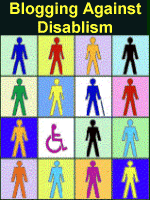
Welcome to Disability Blog Carnival #48!
Several years ago I was a young nurse with the dream of teaching in nursing school someday. To test out my idea I would volunteer to present inservices on various topics at my workplace. It was a disaster. More precisely, I was a disaster!
I would study my topic, I would write my talk, I would practice and practice and practice. I would stand up in front of my co-workers and BOMB. I would forget stuff. I couldn’t answer questions. I would go home and cry.
I took a couple speaking seminars and tried again. And bombed again. And again.
Eventually I vowed that I would never attempt public speaking ever again.
Life went on and I got married and had children—and my youngest was born with Down syndrome. When she was a few months old I was approached by one of my friend’s moms. She was on the organizing committee for a huge seminar that was coming up in Rochester and she wanted me to be on a panel for her program.
I said NO about 75 times, but this was Susan’s mom and the topic was disability and this was Susan’s MOM…. So I did it. And it went great. No, really great—it was easy, I made sense. I answered questions. Once I stopped shaking I even liked it.
What happened???? My dad said it was “the difference between having to say something and having something to say.”
Disability gave me motivation and even skills I use all the time today. And this is just one of the capacities that has been developed in me since disability has become part of my life.
While I have no desire to sugarcoat anyone’s struggles (even my own!)and I am fond of a good old-fashioned rant, I also see value in acknowledging strengths and gifts and skills when I encounter them. These bloggers have their own capacities and capabilities to share:
Suzanne at disabilityjourney explores the gains disability has brought to her life in her post Them or Us. Dave from Chewing the Fat, in one of his wonderful stories, points out that some with disabilities see nonsense as just what it is in Half the Story.
Ettina from abnormaldiversity shares her idea that capacities coming with disability does not apply to people who have had their disability from birth in Disability Teaching a Lesson? But in her post Accepting Imagination Deficit she shares how important her creativity is to her.
Another blogger whose gift of creativity comes through is Maggie from Maggie’s World in her October post. And Goldfish shares some humour and ukulele love in I Went to the Shops and I Bought…
Barbara from Therextras offers advice to parents of kids with disabilities who encounter folks who cannot see their wonderful, beloved children through their disability label/appearance in Blind to Normal.
Confused of Calcultta points out that people with disabilities are at the forefront of hacking and adapting technology to meet specific needs. Check out the post here.
Wheelchair Dancer objects to the concept of capacities and capabilities in relation to disability. She strongly asserts that capacity if often used by society to attribute value to the lives of people with disabilities and they do NOT determine value. Read her post Not Handicapped, Handicapable for some hefty food for thought.
Grace from Disabled 2 Able writes in Learning from Disability about what she learned through physical therapy, her chosen profession and what she and her daughters have learned about life since she contracted polio as a child. Grace says her daughters are skilled at evaluating accessibility. Learn more about accessibility as it relates to hiking trails from brokenclay.org/journal.
In The River of Jordan Jordan’s mom shares her son’s imitable spirit in her post Capacities and Capabilities.
Lorraine at Keep Bloggering On welcomes Sweet Abey James—with a wonderfully sweet picture! Debbie at Pipecleaner Dreams appreciates the value of wonderful treatment that accommodates disability graciously in Can I Take Your Order, Please.
Rickismom has a couple of posts for us about lessons learned at Beneath the Wings. She writes about her daughter’s success in learning chemistry, that some folks disbelieve that people with Down syndrome can learn at all (and their attitudes actually create that situation sometimes) and about how her own learning of language grew as she taught her daughter.
Historiann is a history professor who writes about the politics and economics of disability in her post, Memento mori: why single payer is the only way to go. Rob Q. Ink who often writes about sports (especially Philadelphia sports) as well as disability also examines politics in his post, Jumping into Election ’08. And Ruth at Wheelie Catholic also finds that her political involvement is informed by her disability experience in Well, I Have my Ballot.
Sometimes emotions can be overwhelming as Abby points out in It’s a Bit Early for Thanksgiving—but give thanks she does, as you will see. And Frida shares how she values some of her friends who share her disability as well as her own disability awareness and self-acceptance in the midst of pain in Weekend Update.
Debbie from A Life Without Limits: Rollin’ Into the Future catalogues the many characteristics she developed by going away to school in her post On my Own: Looking Back at my College Experience.
Thank you all for stopping by—come again, we never close! And thanks to all the wonderful bloggers who participated!
The next carnival will be hosted by Blake at I Hate Stairs and the theme will be “Lists.”
Why the picture?? Because disability is a mixed bag! And I got the picture from here.













